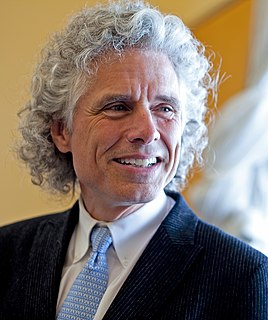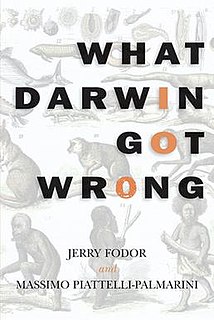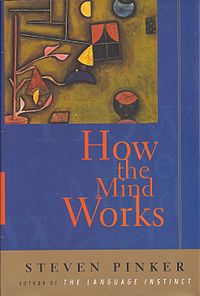
Cognitive science is the interdisciplinary, scientific study of the mind and its processes. It examines the nature, the tasks, and the functions of cognition. Cognitive scientists study intelligence and behavior, with a focus on how nervous systems represent, process, and transform information. Mental faculties of concern to cognitive scientists include language, perception, memory, attention, reasoning, and emotion; to understand these faculties, cognitive scientists borrow from fields such as linguistics, psychology, artificial intelligence, philosophy, neuroscience, and anthropology. The typical analysis of cognitive science spans many levels of organization, from learning and decision to logic and planning; from neural circuitry to modular brain organization. One of the fundamental concepts of cognitive science is that "thinking can best be understood in terms of representational structures in the mind and computational procedures that operate on those structures."
The Chinese room argument holds that a digital computer executing a program cannot have a "mind", "understanding" or "consciousness", regardless of how intelligently or human-like the program may make the computer behave. The argument was presented by philosopher John Searle in his paper, "Minds, Brains, and Programs", published in Behavioral and Brain Sciences in 1980. Similar arguments were presented by Gottfried Leibniz (1714), Anatoly Dneprov (1961), Lawrence Davis (1974) and Ned Block (1978). Searle's version has been widely discussed in the years since. The centerpiece of Searle's argument is a thought experiment known as the Chinese room.

Evolutionary psychology is a theoretical approach in the social and natural sciences that examines psychological structure from a modern evolutionary perspective. It seeks to identify which human psychological traits are evolved adaptations – that is, the functional products of natural selection or sexual selection in human evolution. Adaptationist thinking about physiological mechanisms, such as the heart, lungs, and immune system, is common in evolutionary biology. Some evolutionary psychologists apply the same thinking to psychology, arguing that the modularity of mind is similar to that of the body and with different modular adaptations serving different functions. These evolutionary psychologists argue that much of human behavior is the output of psychological adaptations that evolved to solve recurrent problems in human ancestral environments.

Steven Arthur Pinker is a Canadian-American cognitive psychologist, linguist, and popular science author. He is an advocate of evolutionary psychology and the computational theory of mind.

Eliminative materialism is the claim that certain types of mental states that most people believe in do not exist. It is a materialist position in the philosophy of mind. Some supporters of eliminativism argue that no coherent neural basis will be found for many everyday psychological concepts such as belief or desire, since they are poorly defined. Rather, they argue that psychological concepts of behaviour and experience should be judged by how well they reduce to the biological level. Other versions entail the non-existence of conscious mental states such as pain and visual perceptions.

Jerry Alan Fodor was an American philosopher and the author of many crucial works in the fields of philosophy of mind and cognitive science. His writings in these fields laid the groundwork for the modularity of mind and the language of thought hypotheses, and he is recognized as having had "an enormous influence on virtually every portion of the philosophy of mind literature since 1960." Until his death in 2017 he held the position of State of New Jersey Professor of Philosophy, Emeritus, at Rutgers University.
Modularity of mind is the notion that a mind may, at least in part, be composed of innate neural structures or mental modules which have distinct, established, and evolutionarily developed functions. However, different definitions of "module" have been proposed by different authors. According to Jerry Fodor, the author of Modularity of Mind, a system can be considered 'modular' if its functions are made of multiple dimensions or units to some degree. One example of modularity in the mind is binding. When one perceives an object, they take in not only the features of an object, but the integrated features that can operate in sync or independently that create a whole. Instead of just seeing red, round, plastic, and moving, the subject may experience a rolling red ball. Binding may suggest that the mind is modular because it takes multiple cognitive processes to perceive one thing.
The language of thought hypothesis (LOTH), sometimes known as thought ordered mental expression (TOME), is a view in linguistics, philosophy of mind and cognitive science, forwarded by American philosopher Jerry Fodor. It describes the nature of thought as possessing "language-like" or compositional structure. On this view, simple concepts combine in systematic ways to build thoughts. In its most basic form, the theory states that thought, like language, has syntax.

The Blank Slate: The Modern Denial of Human Nature is a best-selling 2002 book by the cognitive psychologist Steven Pinker, in which the author makes a case against tabula rasa models in the social sciences, arguing that human behavior is substantially shaped by evolutionary psychological adaptations. The book was nominated for the 2003 Aventis Prizes and was a finalist for the Pulitzer Prize.
Neurophilosophy or philosophy of neuroscience is the interdisciplinary study of neuroscience and philosophy that explores the relevance of neuroscientific studies to the arguments traditionally categorized as philosophy of mind. The philosophy of neuroscience attempts to clarify neuroscientific methods and results using the conceptual rigor and methods of philosophy of science.
The cognitive revolution was an intellectual movement that began in the 1950s as an interdisciplinary study of the mind and its processes. It later became known collectively as cognitive science. The relevant areas of interchange were between the fields of psychology, linguistics, computer science, anthropology, neuroscience, and philosophy. The approaches used were developed within the then-nascent fields of artificial intelligence, computer science, and neuroscience. In the 1960s, the Harvard Center for Cognitive Studies and the Center for Human Information Processing at the University of California San Diego were influential in developing the academic study of cognitive science. By the early 1970s, the cognitive movement had surpassed behaviorism as a psychological paradigm. Furthermore, by the early 1980s the cognitive approach had become the dominant line of research inquiry across most branches in the field of psychology.
The term standard social science model (SSSM) was first introduced by John Tooby and Leda Cosmides in the 1992 edited volume The Adapted Mind. They used SSSM as a reference to social science philosophies related to the blank slate, relativism, social constructionism, and cultural determinism. They argue that those philosophies, capsulized within SSSM, formed the dominant theoretical paradigm in the development of the social sciences during the 20th century. According to their proposed SSSM paradigm, the mind is a general-purpose cognitive device shaped almost entirely by culture.

Daniel Joseph Levitin, FRSC is an American-Canadian cognitive psychologist, neuroscientist, writer, musician, and record producer. He is the author of four New York Times best-selling books.
Multiple realizability, in the philosophy of mind, is the thesis that the same mental property, state, or event can be implemented by different physical properties, states, or events. Philosophers of mind have used multiple realizability to argue that mental states are not the same as — and cannot be reduced to — physical states. They have also used it to defend many versions of functionalism, especially machine-state functionalism. In recent years, however, multiple realizability has been used to attack functionalism, the theory that it was originally used to defend. As a result, functionalism has fallen out of favor in the philosophy of mind.
In philosophy of mind, the computational theory of mind (CTM), also known as computationalism, is a family of views that hold that the human mind is an information processing system and that cognition and consciousness together are a form of computation. Warren McCulloch and Walter Pitts (1943) were the first to suggest that neural activity is computational. They argued that neural computations explain cognition. The theory was proposed in its modern form by Hilary Putnam in 1967, and developed by his PhD student, philosopher and cognitive scientist Jerry Fodor in the 1960s, 1970s and 1980s. Despite being vigorously disputed in analytic philosophy in the 1990s due to work by Putnam himself, John Searle, and others, the view is common in modern cognitive psychology and is presumed by many theorists of evolutionary psychology. In the 2000s and 2010s the view has resurfaced in analytic philosophy.
The problem of mental causation is a conceptual issue in the philosophy of mind. That problem, in short, is how to account for the common-sense idea that intentional thoughts or intentional mental states are causes of intentional actions. The problem divides into several distinct sub-problems, including the problem of causal exclusion, the problem of anomalism, and the problem of externalism. However, the sub-problem which has attracted most attention in the philosophical literature is arguably the exclusion problem.
Evolutionary psychology seeks to identify and understand human psychological traits that have evolved in much the same way as biological traits, through adaptation to environmental cues. Furthermore, it tends toward viewing the vast majority of psychological traits, certainly the most important ones, as the result of past adaptions, which has generated significant controversy and criticism from competing fields. These criticisms include disputes about the testability of evolutionary hypotheses, cognitive assumptions such as massive modularity, vagueness stemming from assumptions about the environment that leads to evolutionary adaptation, the importance of non-genetic and non-adaptive explanations, as well as political and ethical issues in the field itself.

Peter Carruthers is a British-American philosopher and cognitive scientist working primarily in the area of philosophy of mind, though he has also made contributions to philosophy of language and ethics. He is Professor of Philosophy at the University of Maryland, College Park, associate member of Neuroscience and Cognitive Science Program and member of the Committee for Philosophy and the Sciences.
The East Pole–West Pole divide in the fields of cognitive psychology and cognitive neuroscience is an intellectual schism between researchers subscribing to the nativist and empiricist schools of thought. The term arose from the fact that much of the theory and research supporting nativism, modularity of mind, and computational theory of mind originated at several universities located on the East Coast, including Harvard University, the University of Michigan, Massachusetts Institute of Technology, and Tufts University. Conversely, much of the research and theory supporting empiricism, emergentism, and embodied cognition originated at several universities located on the West Coast, including the University of California, Berkeley, the Salk Institute, and, most notably, the University of California, San Diego. In reality, the divide is not so clear, with many universities and scholars on both coasts supporting each position, as well as more moderate positions in between the two extremes. The phrase was coined by Jerry Fodor at an MIT conference on cognition, at which he referred to another researcher as a "West Coast theorist," apparently unaware that the researcher worked at Yale University.

What Darwin Got Wrong is a 2010 book by philosopher Jerry Fodor and cognitive scientist Massimo Piattelli-Palmarini, in which the authors criticize Charles Darwin's theory of natural selection. It is an extension of an argument first presented as "Why Pigs Don't Have Wings" in the London Review of Books.









